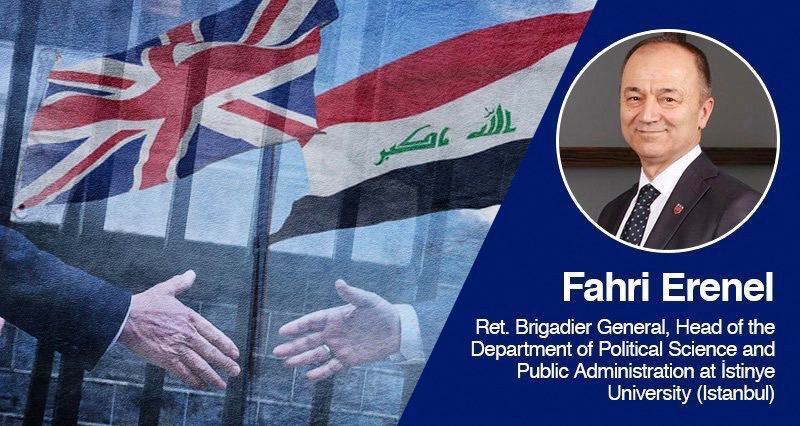The United Kingdom and Iraq have a signed a comprehensive agreement on cooperation in trade, commerce, infrastructure and defense on January 15, 2025. The UK announced its overall volume as 12.3-billion-pound sterling.
It includes UK investments in water pipelines, the construction of railways, cooperation in the energy sector as well as British presence and overhaul of an Iraqi military base in the north of the country.
“Britain is returning to the Middle East, substituting the US”, said retired Turkish Armed Forces General Dr. Fahri Erenel in interview with UWI.
How is your general evaluation of the agreement?
With the redrawing of the borders and the fact that the United States has made a certain progress step by step in the Greater Middle East project, I see it as a reflection of a new cooperation established between Israel, Britain and the United States in this region. Because Britain left in the 1930s. In fact, they ceded the region to the United States in the Middle East in 1945.
After that date, it was only a few years ago that within the scope of this joint coalition established by the United States of America in the context of the fight against ISIS that they took part in this region with their air force in general, and continued their initiatives in this regard, especially in Iraq, and continues to this day.
During the Biden administration, the US and the UK somewhat refreshened their alliance, above all two NATO summits ago. I think that now, with Trump in power, this agreement will continue. Trump will leave the Middle East, solve first the Russia issue and then and focus on China, with the UK and Israel substituting US presence in the region.
The UK will, of course, pursue its own interests in Iraq, which is an important oil producing country that, at the same time, almost is one of the failed states in the world. The UK will take advantage of these oil and gas reserves, in addition to the water, irrigation, energy and infrastructure projects.
The British company BP will play an important role here, while the agreement also opens up the Iraqi market for British products. All in all, this picture shows that the UK is back in the Middle east again.
How will the British presence affect the Turkish project of a Development Road departing from the Persian Gulf, crossing Iraq and Türkiye and heading towards Europe?
Both, positive and negative effects are possible. For instance, there are the oil fields in Kirkuk. Here, we notice some dissenting voices from Erbil against the central government in Bagdad. According to the constitution, these are matters on which the central government decides. They may decide to share some income with the regional government.
But more importantly, we knew about the presence of the US, we knew about China’s infrastructure investments, about Russia’s role in oil production. Now, with the UK entering the stage, Iraq turns into a theater where 4 different grand powers coexist.
In that context, Iraq’s cooperation with the UK means cooperation with the US. In addition, though announced, there is still no timetable for the withdrawal of US forces. And on top of that, 55% of the population is Shia, giving Iran a certain influence.
Now, I expect the UK to pursue policies in favor of the corridor decided upon on the last G-20 summit, the one that departs from India, crosses Saudi Arabia and reaches the Mediterranean. Here, Iraq might play a role, with a transit through the country that reaches a port in Syria, maybe Latakia or south of it.
The UK will now want a corridor that transits Türkiye, because London will not want Ankara to have leverage or be strong.
In addition to that, the security has not yet been established in the north of Iraq, and Iran has not been included into the Development Road. Taking into consideration that tensions are rising in Turkish-Iranian relations, I think that the Development Road project is facing a failure, probably.
How do you evaluate the establishment of a British military base in the north of Iraq?
In Iraq, the instability since the 2005-Biden introduced constitution continues. This is a fractured structure, where we can state that, following the US, the UK assumes protective power functions now. This will affect Türkiye negatively, of course.
The military base of Al Qayyarah in the north covers an area where also the terror organization of the PKK is operating. Why do the British deploy forces here? Only one response seems plausible to me: This base is enforced as an offensive position of the UK, Israel and the US against Iran.

















Leave a Reply